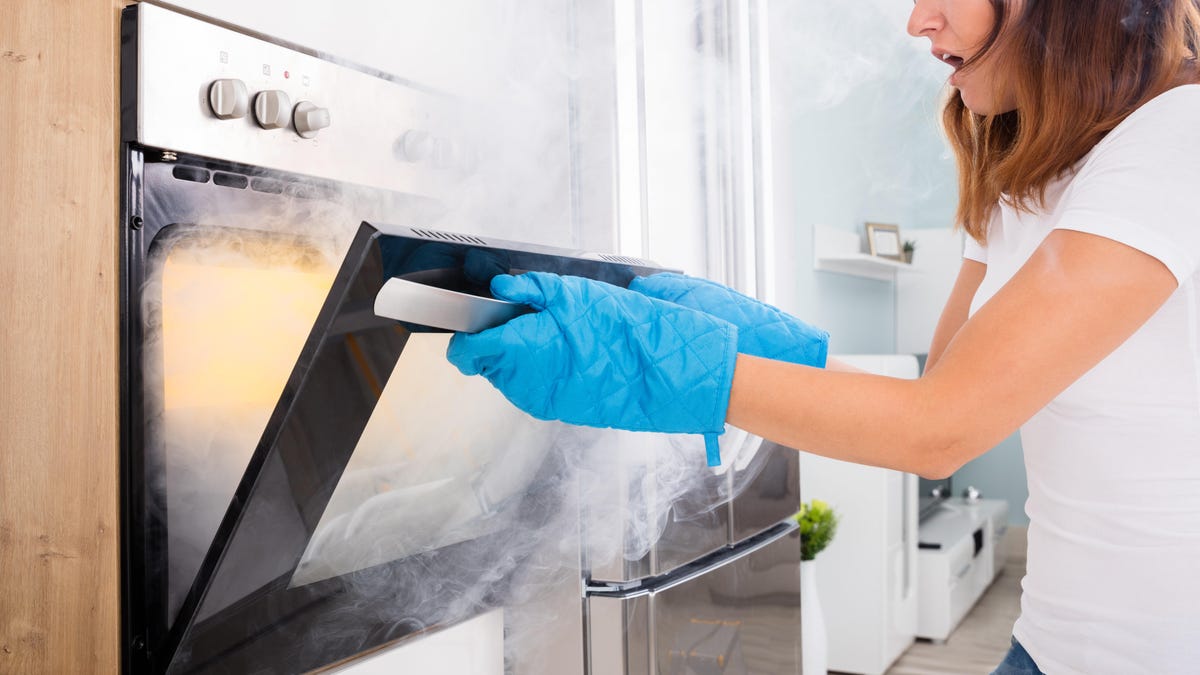[ad_1]

Between spatchcocking birds and air frying cheesecakes this holiday season, I haven’t had much time to think about anything other than putting food inside a hot-maker, and taking it out again. It was only during a recent air frying session that I became very aware of my inability to face a kitchen disaster should one arise. Not only did it make me nearly crap my pants, but afterward, it got me thinking. As holiday parties hit full tilt, take these small kitchen safety measures to ensure 2022 ends without you soiling yourself. (Unless it’s from uncontrollable laughter.)
Get a fire extinguisher
Full disclosure: It was fire. My boyfriend and I nearly set our air fryer ablaze, and although it probably took four seconds to sort out, nothing slows down time like flames you can’t control. I realized that my small Brooklyn apartment would be better with a fire extinguisher. Even professionals overlook these things sometimes. Regardless of your comfort in the kitchen, it’s a place where we consistently deal with high temperatures and a load of variables. Not to mention if you’re in an apartment building, you’re also looking out for the adjoining units whether you like it or not. This article by Apartment Therapy can help you figure out the best type and size of extinguisher for your needs. At minimum, there are even hairspray-sized cans that you can easily keep in a cabinet, and take with you to the rooftop grill.
Use sheet pans to prevent spills
A few drops of molten cheese will occasionally free themselves from your casserole, but after a few minutes of burnt cheese smell, you can get on with the night. It’s when your tarte tatin spews eight ounces of melted butter, or the lasagna bumps the ramekin of garlic confit, that you might have a problem. However unlikely, puddles of oil can potentially catch fire. To catch spills, and prevent dishes from easily toppling over, always put small baking dishes on large baking sheets. Most household ovens can hold up to four quarter sheet pans, and that’s plenty of surface area for you to work your casserole magic. (If you’ve already spilled a load of oil in your oven, check out this article to help you clean it up.)
Don’t rush in the kitchen
Time is of the essence when hosting a holiday bash, but with alcohol flowing and sequins falling off of Gatsby-themed outfits, you need to slow your roll. No one will be upset if you bring the pear puffs out a few minutes later than planned. Rushing in the kitchen rarely results in anything good, and you’re much more likely to break something, cut corners, cut yourself, or spill something.
Stop to clean up spills
When you inevitably spill something while preparing a lovely holiday meal, stop, put everything down in a secure spot, and clean up that mess. “I’ll get that in a minute,” could be one minute too late. Friends, family, or children drifting in and out of the kitchen can make matters worse, leading to an even bigger mess or injury. This is definitely a “stitch in time” moment, so give yourself a breather to clean up spills right away. Chances are that you needed to slow down a bit anyway.
Deep-fry big meats outside
Thanksgiving may be over, but a lot of households still serve up the popular bird for Christmas dinner. Whether it’s turkey, chicken, ham, or boar, if you’re deep frying a giant piece of meat, do it outside. Taste of Home gives a thorough breakdown of how to safely deep fry a turkey, and a lot of these helpful tips apply to any large protein. With the main danger being the immense vat of hot, bubbling oil, deep frying outside means that it’s a distance from your combustible home, and from distracted houseguests that might be milling about with a glass of wine.
Check your carbon monoxide detector
Carbon monoxide incidents happen every year. They’re absolutely terrifying, but also preventable. Anything that burns material will produce carbon monoxide, so amongst other household appliances, gas stoves and ovens can be a source. (For more information on carbon monoxide sources, poisoning, and detection, read here.) Keep heat producing appliances clean, and service them when needed. Get a detector that works for you, and test it occasionally to make sure it’s performing properly. There are many styles of detectors out there, from battery powered to hardwired, and some smoke detectors include them too.
Use slow cookers
Instead of keeping mulled wines and ciders hot on the stove top, use a slow cooker. Sure, stoves have a low setting, but that still means there’s a burner on, and largely unattended. Slow cookers have been expertly crafted to be safely left alone, and, unlike your stove, they have timers and an auto-shut off. Plus, they’re multi-use all year long, so you can cook a ton of things in a crock pot, from heating up glögg to baking a carrot cake. Make food, have fun, and keep a safe kitchen, my friends.
Source link

